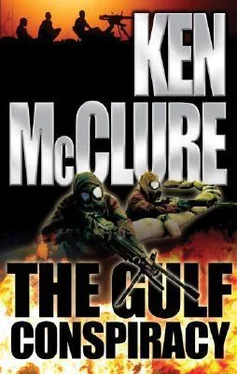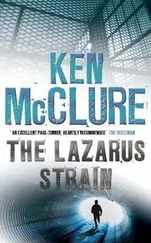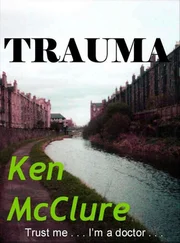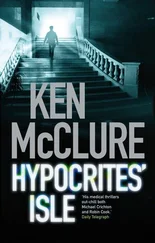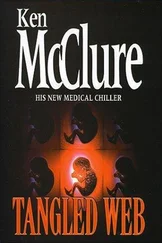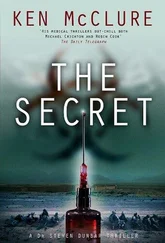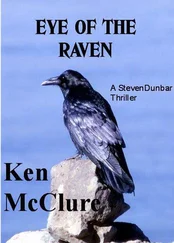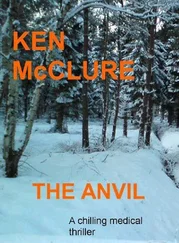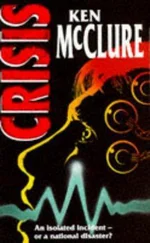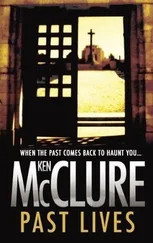Panic returned in an instant and Anderson and Childs struggled back into their suits. A few minutes later the NAIADS sounded again. The base remained in NBC Condition Black (under chemical and biological attack) for the next eight hours.
It was two days before the men saw Gus Maclean again. He was in the canteen, sitting on his own, toying with a meal that he was obviously finding less than appetising.
‘So what gives?’ asked Anderson, sitting down beside him.
Maclean shrugged and glanced from side to side before saying, ‘The official line is that there was no confirmed chemical attack on the base.’ He stressed the word ‘confirmed’.
‘I though you guys confirmed it,’ said Childs.
‘Every detector on the fucking base was screaming gas attack but the brass are pretending it never happened. What’s the point of having the team here if they’re not going to believe us? Who else can “confirm” it if we can’t for Christ's sake?’
‘Fuck me,’ said Childs. ‘You couldn’t make it up, could you?’
‘My granddad used to tell me about the fuck-ups the army made in his war,’ said Anderson. ‘Lions led by donkeys and all that. Some things never change.’
‘And what about the all-clear sounding?’ asked Childs.
‘That’s something else again,’ said Maclean. ‘Nobody’s putting up their hands for that one. Hundreds of our guys were exposed to nerve gas unnecessarily and no one’s to blame. It just never happened.’
‘Bad enough fighting the Iraqis without our own mob having a go at us as well,’ said Childs.
32 Field Hospital
Wadi al Batin
23rd January 1991
Surgeon Commander James Morton watched as the helicopter touched down and sent sand flying up in all directions. As its side door slid open, three field medics ran forward in a crouching run to assist in evacuating the patient from the aircraft. The injured man was a vehicle technician who had been working on an armoured personnel carrier and whose arm had been caught in the half-track when a fellow technician, unaware of his presence, had started up the vehicle and attempted to move off. The man’s right arm had been all but severed. Plans to fly him to a proper hospital had had to be abandoned when blood loss became critical. Wadi Al Batin was the nearest place with the sort of medical facilities that might be able to cope with the situation.
Morton looked at the face of the unconscious man and listened as one of the field medics reeled off a series of statistics as the patient was transferred from stretcher to table. He couldn’t be much more than twenty years old. He should have had all of his life before him. ‘Blood?’ he asked.
‘On its way,’ replied one of the masked nurses.
‘Let’s have a look,’ murmured Morton as he gingerly peeled away the wad of dressings from the patient’s arm. ‘What’s his name?’
‘Jackson, sir. Private Robert Jackson.’
‘Well, Private Jackson,’ said Morton. ‘I’m afraid your soldiering days are over, old son, and I hope to God you’re left-handed because this is going to have to come off. Make ready for amputation everyone, will you? How’s he doing?’
The question was directed at the anaesthetist, a young RAMC lieutenant who had taken up station at the head of the patient and was taking readings from the monitors he’d been attaching to Jackson.
‘Not good. He’s very weak.’
‘As I see it, we don’t have much of an option,’ said Morton.
‘You don’t think it’s worthwhile just trying to stabilise him and then transferring him to somewhere with a proper ICU?’ asked the lieutenant.
Morton shook his head slowly. ‘Much as I’d like to, I don’t think I could get him stable with that mess still attached to his shoulder. Apart from that, the chance of infection in this hell-hole increases with every minute that passes. His only hope is a quick amputation, so let’s get on with it. Where the hell’s that blood?’
‘It’s here,’ replied one of the masked figures as a vehicle pulled up outside the field hospital.
Twenty minutes later Morton paused and stood back to allow the severed limb to be wrapped in gauze and removed from the table. Once again he asked for an update on the patient’s condition as he drew together the two flaps of skin he’d deliberately left attached in order to form a neat stump and started suturing them.
‘Still iffy,’ replied the anaesthetist.
‘I’ll be as quick as I can.’
Morton’s hand jumped as the air raid warnings went off and he cursed as the needle made an inch long scratch on the patient’s skin.
‘That’s all we need,’ said the anaesthetist. ‘An air raid.’
‘Scud attack,’ said someone else. ‘Listen.’
In the ensuing pause they listened to the sound of the incoming missile.
‘I think it’s going over,’ said an optimist only a fraction before there was a loud popping sound, which made people look questioningly at each other over their masks.
‘Oh Christ, no explosion means it’s an airburst,’ said the reformed optimist.
Morton continued sewing his neat line of stitches, as around him, people shuffled to their feet and looked at each other uneasily over their masks. Then the NAIADS went off and loudspeakers started proclaiming: ‘NBC Condition Black. This is not a drill!’ It kept repeating, ‘This is not a drill.’
‘Okay folks, you know what to do,’ said Morton, still concentrating on his work and not looking up. ‘Everyone into their suits please.’
No one argued but the anaesthetist said, ‘I can’t just walk away. He’ll die.’
‘You might die if you don’t,’ said Morton.
‘I’ll go when you do.’
Morton smiled under his mask. ‘Fair enough.’ The procedure was all over in seven minutes but it seemed more like seven hours to the two men. ‘Right, you go first and get into your suit,’ said Morton, stripping off his gloves. ‘Bring up a respirator for him as well, and then you can take over while I get into mine. We’ll keep him on the gas for the time being.’
The anaesthetist needed no second bidding.
Three hours later and despite the best efforts of Morton and the team, Vehicle Technician Robert Jackson died without ever coming round. Some two hours after that Morton and the anaesthetist started to feel ill. Both men suffered blinding headaches, stomach cramps and prolonged episodes of vomiting throughout the following night.
‘Do they know what it was yet?’ gasped Morton as he found respite for a few minutes after yet another round of vomiting. He asked the question of one of his colleagues who had just wiped the sweat from his face as the sun came up over the base.
‘Unidentified chemical attack is all I could get out of the commandant’s office,’ replied the young doctor.
‘How about the monitoring team?’
‘The technicians are saying it was Sarin but that hasn’t been confirmed.’
‘What does the manual say about that?’
‘The only information I could come up with comes from studies they did on volunteers a while back. According to that, you seem to be exhibiting the effects of low level exposure to the gas.’
‘Christ, I wouldn’t like to find out what high level exposure feels like,’ said Morton. ‘Do we know what the long term effects are?’ he asked.
‘There’s nothing at all in the manual. The official view seems to be that it’s best not to breathe it in the first place.’
‘Who would have thought?’ said Morton before another bout of stomach cramps made him curl up and cry out in pain. When the pain subsided he lay back on the pillow and took a moment or two to steady himself before asking, ‘Surely they must have done follow-up studies on the volunteers?’
Читать дальше
